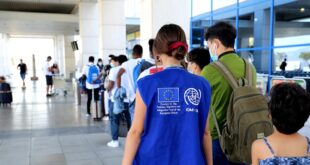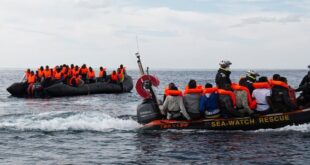Libya’s Prime Minister Fayez Mustafa al-Sarraj promised on Thursday to take action to ease the suffering of tens of thousands of migrants stranded in his North African country, even though it is still battling instability.
Speaking after talks with German Chancellor Angela Merkel in Berlin, Al-Sarraj said the numbers of migrants are “staggering — we are talking about 500,000 migrants outside holding centres and 20,000 in the 42 centres run by the Interior Ministry.”
But he said that last month’s two-day summit in Abidjan on the migration crisis has prompted some African countries to take action.
“Some African countries began to organise flights to repatriate their citizens and we are very open and cooperative with these countries,” Al-Sarraj said, adding that Tripoli has also agreed with Rome to set up repatriation offices in migrant holding centres.
“And we are open to working with all regional and international organisations to end the suffering of the migrants and to help them return to their countries,” added the Libyan prime minister.

Merkel meanwhile pledged help from the EU, saying that “from Europe, we will provide support so that many can go home” to their countries of origin.
She also urged al-Sarraj to give “better access” to international organisations to the holding camps.
Addressing recent reports that some migrants had even been sold into slavery, Al-Sarraj said a commission of inquiry will soon deliver findings on whether the claims are substantiated.
“We express our total condemnation of such practice if it really exists,” he said.
US television network CNN aired the footage last month of an apparent live auction in Libya where Black African men were presented to Arab buyers as potential farmhands and sold off for as little as $400.
Human-trafficking networks have flourished in the chaos that followed a NATO-backed uprising which toppled long-time Libyan dictator Muamar Gaddafi in 2011.
More than 8,800 stranded migrants have been returned home this year, according to the International Organization for Migration, which is also compiling evidence of slavery.
© AFP
 THE AFRICAN COURIER. Reporting Africa and its Diaspora! The African Courier is an international magazine published in Germany to report on Africa and the Diaspora African experience. The first issue of the bimonthly magazine appeared on the newsstands on 15 February 1998. The African Courier is a communication forum for European-African political, economic and cultural exchanges, and a voice for Africa in Europe.
THE AFRICAN COURIER. Reporting Africa and its Diaspora! The African Courier is an international magazine published in Germany to report on Africa and the Diaspora African experience. The first issue of the bimonthly magazine appeared on the newsstands on 15 February 1998. The African Courier is a communication forum for European-African political, economic and cultural exchanges, and a voice for Africa in Europe.

























